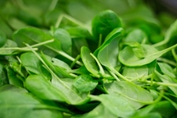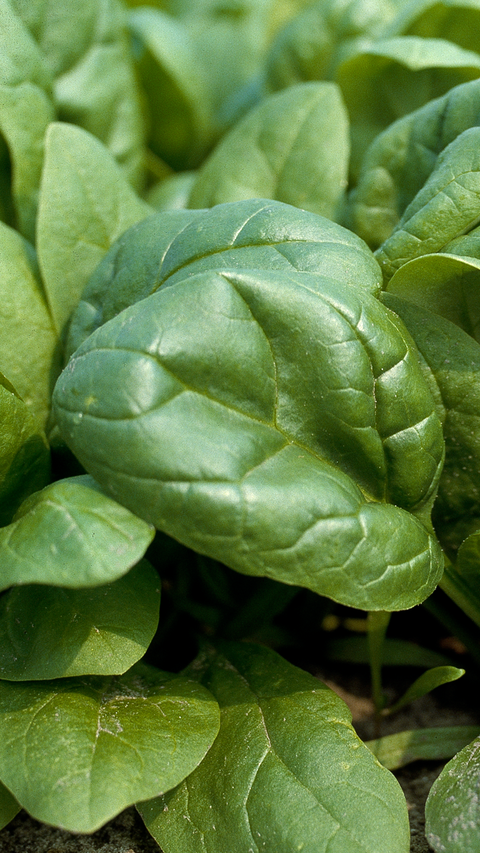News & Events
BASF | Nunhems Spinach Portfolio Uses Genetic Strength for Optimal Yield
Growers can stay ahead of shifting disease pressures this season with proven, high-performing varieties.
.jpg)
PARMA, Idaho (July 16, 2025) – With a focus on dependable yield and advanced disease resistance, BASF’s vegetable seeds business, operating in the market under the Nunhems® brand, offers a spinach portfolio that reflects years of research, breeding expertise and field-tested performance tailored to today’s production challenges.
As a key crop within the vegetable seed portfolio, BASF | Nunhems spinach offers top-quality genetics to help growers maintain profitability under increasingly complex conditions. One of the more significant threats spinach growers will face this season is downy mildew, caused by Peronospora effusa. That’s why BASF | Nunhems' experienced team of breeders and scientists work to stay ahead of shifting disease pressures.
BASF | Nunhems spinach varieties are integrated with a combination of premium traits, including vibrant color, tender texture, fast growth qualities and adaptability across different production environments. Through years of investment in research and development for resistance breeding, BASF | Nunhems' lineup now includes more than 10 spinach varieties resistant to Peronospora effuse in the U.S., giving growers more options and greater peace of mind for market production.
Beyond downy mildew, BASF | Nunhems varieties help growers combat additional challenges like damping off, leaf spot, and white rust—all of which can damage crops and negatively impact the return on investment for growers.
“Spinach is one of the most dynamic crops in our portfolio,” said Philip Simons, senior spinach breeder at BASF | Nunhems. “Our process starts with a broad genetic foundation, including wild accessions from spinach’s center of origin in the mountains of Iran. This allows us to build in strong resistance while maintaining the visual and textural quality growers and consumers expect.”
This approach, backed by active participation in the International Working Group on Peronospora (IWGP), a group that works to identify downy mildew races and track the emergence of new, resistance-breaking isolates, allows BASF | Nunhems to stay ahead of emerging pathogen strains and keep spinach growers equipped with the best available tools. The company’s ability to respond quickly to new disease threats is rooted in its strong pre-breeding efforts and ongoing field performance evaluations.
As regulatory changes reduce access to certain seed treatments, genetic solutions are becoming even more critical. Simons emphasizes that it’s not just about choosing the right variety, it's also about diversification.
“We always recommend growers use multiple spinach varieties in the same field—even if they’re all from Nunhems,” said Simons. “That way, if a new isolate shows up that affects one variety, the others can still perform. Genetic diversity protects your yield and keeps you in business.”
Standout varieties like NEMBUS, and Acrux, a newer option gaining traction for its resistance and consistency, continue to lead the market. As most spinach varieties phase out of production within four years due to evolving resistance needs, BASF | Nunhems' ability to deliver fresh, reliable genetics consistently year after year is what sets it apart.
Growers can contact their local BASF | Nunhems Sales Representative or visit www.nunhems.com to learn more about our portfolio.
About BASF’s Agricultural Solutions division
Everything we do, we do for the love of farming. Farming is fundamental to provide enough healthy and affordable food for a rapidly growing population, while reducing environmental impacts. That’s
why we are working with partners and experts to integrate sustainability criteria into all business decisions. With €919 million in 2024, we invest in a strong R&D pipeline, combining innovative thinking with practical action in the field. Our solutions are purpose-designed for different crop systems. Connecting seeds and traits, crop protection products, digital tools and sustainability approaches, to help deliver the best possible outcomes for farmers, growers and our other stakeholders along the value chain. With teams in the lab, field, office and in production, we do everything in our power to build a sustainable future for agriculture. In 2024, our division generated sales of €9.8 billion. For more information, please visit www.agriculture.basf.com or our social media channels.
About BASF
At BASF, we create chemistry for a sustainable future. Our ambition: We want to be the preferred chemical company to enable our customers’ green transformation. We combine economic success with environmental protection and social responsibility. Around 112,000 employees in the BASF Group contribute to the success of our customers in nearly all sectors and almost every country in the world. Our portfolio comprises, as core businesses, the segments Chemicals, Materials, Industrial Solutions, and Nutrition & Care; our standalone businesses are bundled in the segments Surface Technologies and Agricultural Solutions. BASF generated sales of €65.3 billion in 2024. BASF shares are traded on the stock exchange in Frankfurt (BAS) and as American Depositary Receipts (BASFY) in the United States. Further information at www.basf.com.
Information provided is based on experience with tests, trials, or practices as well as general observations over multiple years.
Individual results may vary. Nunhems USA, Inc. (“Nunhems”) strives to provide accurate and complete information, descriptions, content, illustrations, images, and data (“Information”) on its websites, social media sites/posts, and printed materials (“Publications”) as such Information is reasonably available to Nunhems at time of compilation. When the Information is based on experiences with tests, trials, or practices, such Information is provided by Nunhems as closely as commercially possible to such experiences. Information may also be based on general observations. However, Nunhems cannot guarantee the Information in any form whatsoever; therefore, the Information is provided on an ‘AS IS’ basis and without any guarantee, either express or implied, including, without limitation, that the Information is accurate or complete. Under no circumstances is the Information to be considered as advice or as a recommendation. Buyer is solely responsible for seed selection and purchasing decisions, including whether to rely upon the Information and for determining suitability of the seed for the intended growth and use under buyer’s local conditions.
The Publications are intended to help buyer identify plant diseases that may or could affect his/her crops. The images may give a distorted image of reality andmay otherwise not be an accurate portrayal of the disease

